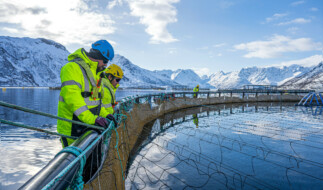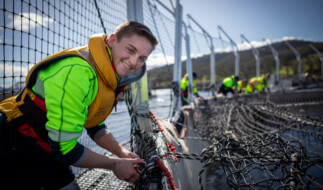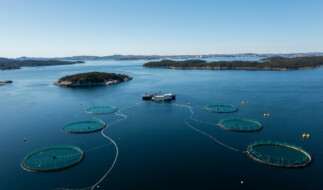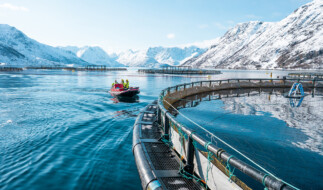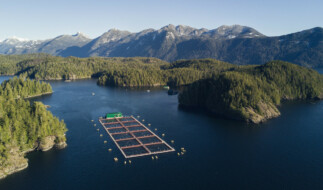Sustainability has no end goal in our minds. We are committed to using collaboration to catalyze advancements in aquaculture that drive healthier, more sustainable diets and food systems – today and for generations to come.
Our priority areas of focus, where we can have a greater impact by working together, include climate action, respect for nature, and contributions to sustainable food systems.
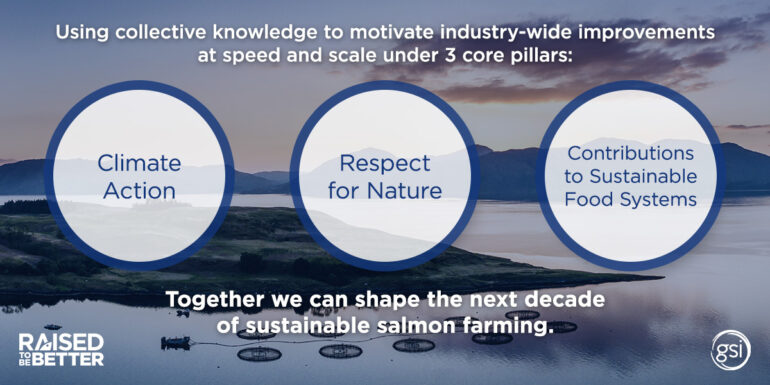
Our goals
When we visualize the future of food, we must ask four key questions: How can we produce enough? Is it healthy? Is it sustainable? How will producers be affected by a changing climate? The food sector is under pressure to keep up with increased demand for food: producing more with limited resources, facing environmental challenges in which they operate, and providing nourishment for the population. Therefore, it’s critical for the food sector to find ways to produce climate-resilient food with the highest nutritional value and the lowest environmental footprint.
Aquaculture is one of the most eco-efficient ways of producing protein. Salmon farming is leading the way in aquaculture innovation – offering one possible solution to support global goals for health, food, and climate, while supporting healthy and thriving oceans.
However, to reach this vision of providing healthy protein at less environmental cost – change is needed at speed and scale.
Over the past decade, GSI CEOs have been working together, united by the belief that focusing on areas where collective action can drive significant improvements in sustainability is crucial. As GSI, we recognize the need for ongoing adaptation to achieve our sustainability goals. Therefore, we established three pillars that will guide our work: climate action, respect for nature, and contributions to sustainable food systems.
Climate Action
Carbon footprint
Addressing climate change and delivering measurable progress towards global climate goals requires significant action, and we know we cannot do this alone. GSI member companies are committed to measure and report greenhouse gas (GHG) emissions for their product’s footprint. They will do this against an aligned GHG Action Index developed to demonstrate progress towards the 1.5°C target outlined by the Intergovernmental Panel on Climate Change as essential to curtail rising temperatures.
Resiliency
A changing climate poses significant risk to the food sector, including aquaculture, which is already seeing the impacts of warming oceans. This is part of why we are committed to improving our understanding of the risks posed by a changing climate and assessing adaptation approaches. Above all, we are working together to enhance the sector’s resiliency for the future, ensuring our efforts are grounded in science.
Respect for nature
Fish health and welfare
Salmon farming is one of the most technically advanced aquaculture sectors, and we use this expertise to stay at the forefront of health and welfare practices. Our members are committed to continuous improvements in fish welfare to ensure the highest possible standards. This includes utilizing a holistic approach to fish health management via medicinal and non-medicinal approaches, utilizing technical advancements in how we monitor and protect fish welfare, and aligning with certifications to ensure best practices.
Biodiversity
As fish farmers, we recognize the importance of all species and ensuring future biodiversity in our oceans and on land. Which is why we are committed to supporting biodiversity protection, regeneration, and nature-positive actions across our supply chains. Working with our partners to improve knowledge of our supply chains and continually assessing for alternative approaches is essential. This includes improving the efficiency of forage fish conversion ratios, committing to only use deforestation-free soy in feed and more. As we look to build knowledge across our supply chains, we can make informed choices on how we can reduce our impact on nature and support a more resilient planet.
Contributions to sustainable food systems
Social responsibility
GSI members are committed to supporting the development of communities through the provision of healthy food, as well as supporting those in the areas where we operate. Because salmon farms are often located in remote communities, it becomes even more crucial that our operations provide a positive contribution. This commitment goes beyond our regional borders and extends to supporting wider aquaculture development in high-need areas to meet global needs for nutritious, climate-resilient food.
Within GSI, we’ve witnessed the benefits of empowering individuals with diverse backgrounds and expertise, which is why our members are committed to supporting gender equality initiatives. The salmon sector strives to unite people and celebrate diverse perspectives to build a stronger, more resilient industry.
Supporting nutritious diets
Responsibly farmed salmon is a nutrient-rich food that supports healthy and sustainable diets. Globally, many dietary guidelines recognize the importance of sustainably sourced seafood to help meet nutritional needs, but reach and consistency is lacking, particularly in recognizing ASC-certified seafood.
Salmon is nutrient-dense and contributes protein and healthy fats like omega-3 fatty acids, which support vision, brain, and heart health. In fact, 80% of people worldwide are not getting enough EPA and DHA omega-3s. Farmed salmon has a lower carbon footprint, freshwater consumption, and feed conversion ratio than many other protein options, making it an important eco-efficient protein source for a growing global population.
Within GSI, we use collaboration to motivate ambitious sustainability goals and provide a framework to deliver measurable progress and ensure our members farm salmon that’s raised to be better for people and planet.
